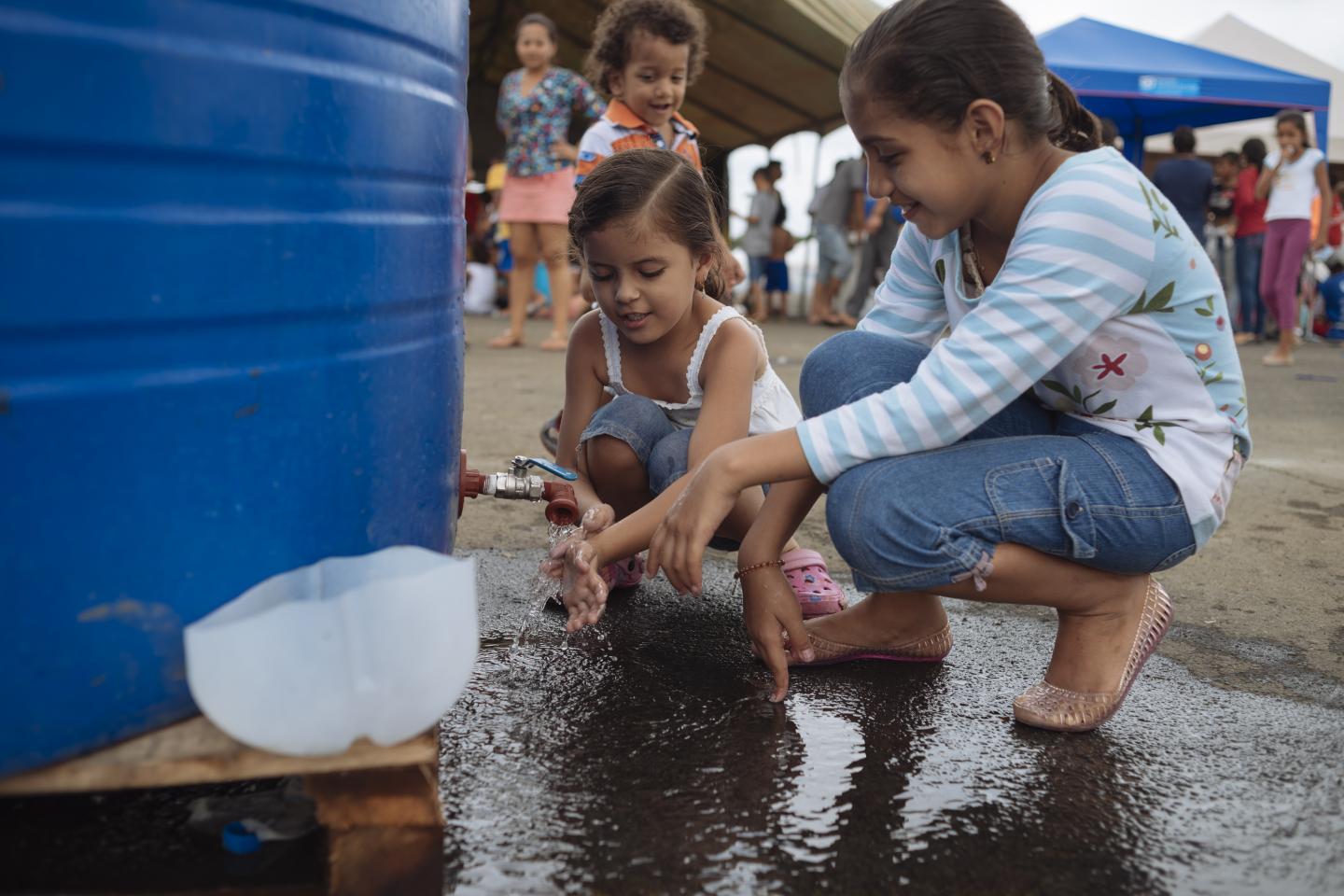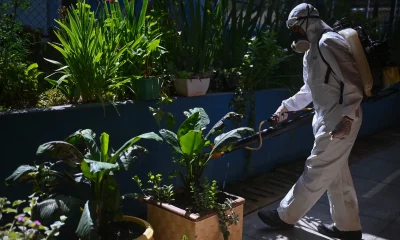International
Water, one of the resources most impacted by climate change in Latin America

March 28 |
Water is at risk. Climate change has caused phenomena such as rising sea levels, droughts, floods, and extreme temperatures to affect the water cycle and water quality: an essential resource for living beings, food production, and the socioeconomic development of populations.
The most recent report of the Intergovernmental Panel on Climate Change of the United Nations (UN) states that due to the increase in extreme weather events resulting from global warming, water insecurity associated with climate will increase.
The United Nations Educational, Scientific and Cultural Organization (UNESCO) stresses that “between 2 and 3 billion people suffer water shortages for at least one month a year”. Figures that according to the institution will double “from 930 million in 2016 to 1.7-2.4 billion people in 2050”:
“It is said that by 2040 we are going to have such big droughts and so much lack of water that many nations and many populations are going to have to emigrate (…) We are definitely going to have land struggles, land where there is water, where there is drinking water,” Thais Lopez, the director of the Volo Foundation, a private organization that advocates fighting climate change and improving education and health, told Voice of America.
Against this backdrop, Lopez says that “the problems of the poorest countries are going to be exacerbated”.
Situation in Latin America:
According to the World Bank, Latin America has almost a third of the world’s water resources, representing the highest water endowment per capita. However, environmental conditions, exacerbated by climate change, have depleted reserves.
“This is very evident in Chile, Peru and northwestern Mexico, because these arid zones are becoming increasingly hotter and the availability of water is beginning to be a determining factor,” Rodolfo Lacy, Director of Climate Action and Environment for Latin America at the Organization for Economic Cooperation and Development (OECD) and Special Envoy for Climate Affairs at the United Nations, told the Voice of America.
Lacy also stresses that water scarcity is “directly linked” to food production. He explains that if measures are not taken, such as modifying agricultural activities in order to dose water, or implementing infrastructures to monitor climate conditions, food-producing regions, such as the Paraná basin in Brazil, Uruguay and Argentina, or the Bajío in Mexico, could be affected.
“Agricultural activities that in some way depend on high humidity will also be affected, because as humidity decreases in tropical regions, some super crops such as bananas or coffee will have less chance of being developed as we had been doing so far,” said Lacy.
Another factor that worries professionals is water quality.
Quality water may contain microorganisms and chemical substances that can cause diseases such as diarrhea or intoxication, according to the Pan American Health Organization (PAHO).
The institution highlights that approximately 7,600 children under 5 years of age die annually from diarrheal diseases in Latin America. The countries with the highest percentages of mortality due to diarrhea among the youngest children are Haiti (23%), Guatemala (10%), Bolivia (7%) and Venezuela (5%).
According to Rodolfo Lacy, aquatic contamination should be prevented through measures such as avoiding dumping waste in the water and reducing fertilizers.
“Water is sometimes used to dispose of all kinds of waste (…) We know very well the problem of plastics in bodies of water both on land and in the ocean, such as chemicals, for example, that dissolve in water (…) Some of them (are) very toxic to animal and plant life.”
The expert points out that the situation is especially complex in Latin America, where sometimes there is no adequate method in wastewater treatment systems.
“We are especially concerned about some ecosystems such as mangroves, which protect us from extreme hydro meteorological phenomena, such as hurricanes or rising seas (…) They can quickly disappear and that is what has happened,” he adds.
“It is said that we eat a card, the equivalent of a credit card, not only because of plastic packaging, because of everything we drink in plastic packaging, but because fish are consuming the plastic that is disposed of in our oceans,” explains Thais Lopez, of the Volo Foundation.
“It’s time to act”:
With the aim of organizing concrete actions related to water and sanitation around the world, the United Nations held a water conference March 22-24 in New York, the first such event in nearly 40 years.
Following the conference, it was proposed to appoint a special commissioner for water, and a multitude of non-binding agreements were drawn up to facilitate access to quality water and sanitation, such as the construction of toilets and the restoration of rivers and lakes damaged by human activity.
The organization’s Secretary General, Antonio Guterres, assured in his final speech that the proposals will be reviewed in July at high-level political meetings, and reiterated the importance of “committing to a common future”.
“There can be no sustainable development without water,” he said: “It is time to act”.
International
Football Fan Killed in Clashes After Colombian League Match

Fans of Cúcuta Deportivo and their traditional rivals Atlético Bucaramanga clashed outside the stadium following their local league match on Tuesday, leaving one supporter dead and several others injured.
The deceased fan was stabbed, according to a senior police official in Cúcuta who confirmed the cause of death in a video statement. Local media reported that the victim was a supporter of the visiting team, Atlético Bucaramanga.
The match ended in a 2-2 draw. Authorities had banned the entry of Atlético Bucaramanga’s organized supporters into the stadium in an effort to prevent disturbances.
Despite the restrictions, violence broke out in the surrounding areas after the game. Among the injured were three police officers, an institutional source told AFP.
The incident adds to a series of recent violent episodes linked to Colombian football. The most recent occurred in December, when supporters of Atlético Nacional and Independiente Medellín clashed in the stands and on the pitch, leaving 59 people injured.
International
Missing Spanish Sailor Rescued After 11 Days Adrift in Mediterranean

The man had departed from the port of Gandía, on Spain’s eastern coast, with the intention of reaching the southern Spanish town of Guardamar del Segura, a journey of about 150 kilometers, a spokesperson for Spain’s maritime rescue service told AFP.
Search boats and aircraft were deployed on January 17, but the operation was called off on January 22 after efforts proved unsuccessful. Alerts were then issued to vessels navigating the area in case they spotted any signs of the missing sailor.
As hopes were fading, a surveillance aircraft from the European Union’s border agency Frontex spotted the sailboat on Tuesday, along with a person signaling for help, approximately 53 nautical miles northeast of Bejaia, Algeria.
A nearby vessel, the Singapore-flagged bulk carrier Thor Confidence, carried out the rescue and is expected to bring the man to an end to his ordeal when it arrives on Thursday in the southern Spanish port city of Algeciras.
Maritime rescue services shared images on social media showing a small white sailboat drifting at sea and secured alongside the much larger ship.
It remains unclear how the sailboat ended up hundreds of kilometers off its intended route or how the man managed to survive for so long alone in open waters.
International
Rubio Says U.S. Could Participate in Follow-Up Russia-Ukraine Talks

The United States could join a new round of talks this week aimed at ending Russia’s invasion of Ukraine, Secretary of State Marco Rubio said on Tuesday.
Teams from Kyiv and Moscow met last Friday and Saturday in Abu Dhabi in their first publicly acknowledged direct negotiations to discuss the peace initiative promoted by former U.S. President Donald Trump.
“They are going to hold follow-up talks again this week,” Rubio told the Senate Foreign Relations Committee. “There could be U.S. participation.”
However, Rubio suggested that Washington’s role may be more limited than during last week’s discussions, which included Steve Witkoff, the president’s special envoy, and Jared Kushner, Trump’s son-in-law.
The secretary of state indicated that progress may have already been made on security guarantees for Ukraine, one of Kyiv’s key demands in any agreement with Moscow after nearly four years of Russian invasion.
“There is one remaining issue that everyone is familiar with, and that is the territorial claim over Donetsk,” Rubio said, referring to the eastern Ukrainian region that Russia wants Ukraine to cede.
“I know that active efforts are underway to see whether the positions of both sides on this issue can be reconciled. It remains a bridge we have not yet crossed,” he added during the hearing.
Rubio acknowledged that the territorial question would be particularly difficult for Ukraine to resolve.
-

 Central America2 days ago
Central America2 days agoGuatemala seizes over a ton of cocaine hidden in flour at Pacific port
-

 International5 days ago
International5 days agoTrump-Era Defense Plan Prioritizes Border Security and Scales Back Global Commitments
-

 International5 days ago
International5 days agoBogotá and Quito Seek Dialogue After Tariffs and Power Cut Escalate Tensions
-

 International4 days ago
International4 days agoDelcy Rodríguez seeks political agreements after Maduro’s ouster
-

 International2 days ago
International2 days agoSpain’s irregular migrant population rises to 840,000, study finds
-

 International2 days ago
International2 days agoHistoric snowstorm paralyzes Toronto after 60 centimeters of snow
-

 International4 days ago
International4 days agoFederal immigration agents kill man in Minneapolis, sparking protests and outrage
-

 Central America1 day ago
Central America1 day agoGuatemala Police Arrest Prison Guard Caught in the Act of Extortion
-

 Central America1 day ago
Central America1 day agoHonduras swears in conservative president Asfura after disputed election
-

 Central America1 day ago
Central America1 day agoBukele leads public trust rankings as UCA survey highlights gains in security
-

 International1 day ago
International1 day agoDoomsday clock moves to 85 seconds before midnight amid rising global risks
-

 International1 day ago
International1 day agoWinter Storm Fern Leaves 30 Dead and Over One Million Without Power Across the U.S.
-

 Sin categoría1 day ago
Sin categoría1 day agoEight Killed in Series of Armed Attacks in Ecuador’s Manabí Province
-

 International2 days ago
International2 days agoRights group says nearly 6,000 killed in Iran protest crackdown
-

 International1 day ago
International1 day agoSpain approves plan to regularize up to 500,000 migrants in Historic Shift
-

 International2 days ago
International2 days agoVenezuela frees at least 80 political prisoners, NGO says
-

 Sin categoría1 day ago
Sin categoría1 day agoEl Salvador Launches Fourth Year of Ocean Mission to Protect Marine Ecosystems
-

 International2 days ago
International2 days agoEU launches new probe into X over AI-generated fake nude images
-

 International4 hours ago
International4 hours agoMissing Spanish Sailor Rescued After 11 Days Adrift in Mediterranean
-

 International4 hours ago
International4 hours agoRubio Says U.S. Could Participate in Follow-Up Russia-Ukraine Talks
-

 International4 hours ago
International4 hours agoFootball Fan Killed in Clashes After Colombian League Match
-

 Central America4 hours ago
Central America4 hours agoGuatemala President Says Starlink Terminal Found Inside Prison
-

 International2 days ago
International2 days agoSevere winter storm grips U.S., leaves multiple dead as extreme cold persists
-

 International2 days ago
International2 days agoFrance debates ban on social media for children under 15






























